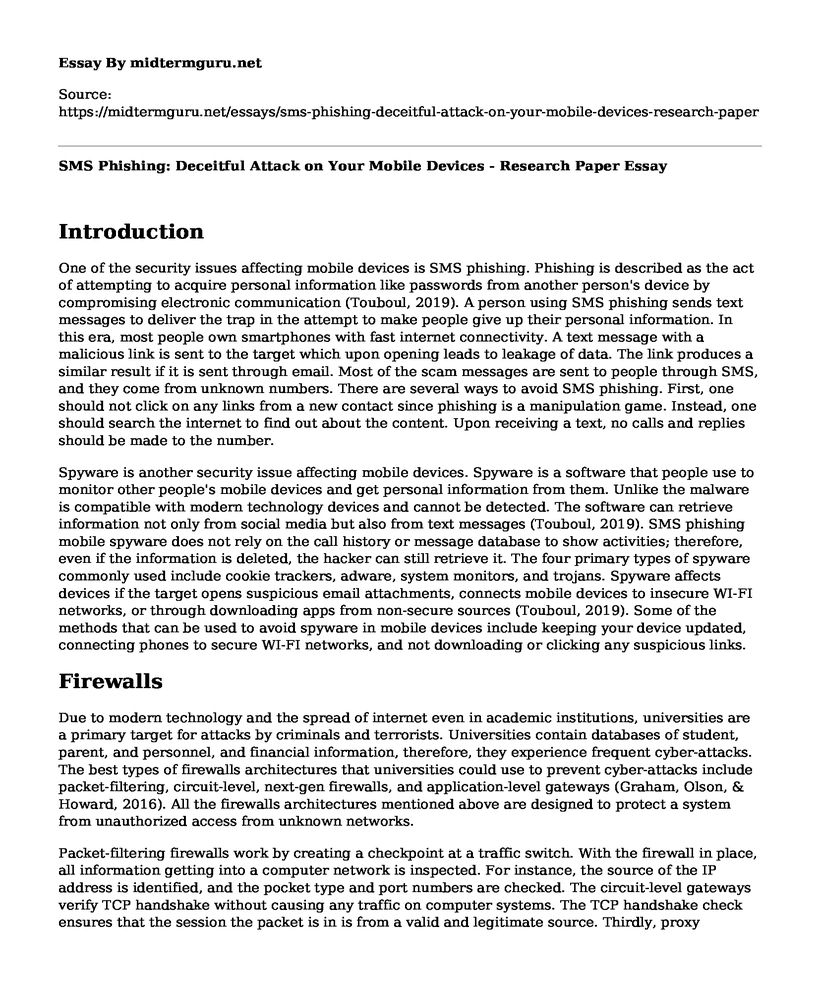Introduction
One of the security issues affecting mobile devices is SMS phishing. Phishing is described as the act of attempting to acquire personal information like passwords from another person's device by compromising electronic communication (Touboul, 2019). A person using SMS phishing sends text messages to deliver the trap in the attempt to make people give up their personal information. In this era, most people own smartphones with fast internet connectivity. A text message with a malicious link is sent to the target which upon opening leads to leakage of data. The link produces a similar result if it is sent through email. Most of the scam messages are sent to people through SMS, and they come from unknown numbers. There are several ways to avoid SMS phishing. First, one should not click on any links from a new contact since phishing is a manipulation game. Instead, one should search the internet to find out about the content. Upon receiving a text, no calls and replies should be made to the number.
Spyware is another security issue affecting mobile devices. Spyware is a software that people use to monitor other people's mobile devices and get personal information from them. Unlike the malware is compatible with modern technology devices and cannot be detected. The software can retrieve information not only from social media but also from text messages (Touboul, 2019). SMS phishing mobile spyware does not rely on the call history or message database to show activities; therefore, even if the information is deleted, the hacker can still retrieve it. The four primary types of spyware commonly used include cookie trackers, adware, system monitors, and trojans. Spyware affects devices if the target opens suspicious email attachments, connects mobile devices to insecure WI-FI networks, or through downloading apps from non-secure sources (Touboul, 2019). Some of the methods that can be used to avoid spyware in mobile devices include keeping your device updated, connecting phones to secure WI-FI networks, and not downloading or clicking any suspicious links.
Firewalls
Due to modern technology and the spread of internet even in academic institutions, universities are a primary target for attacks by criminals and terrorists. Universities contain databases of student, parent, and personnel, and financial information, therefore, they experience frequent cyber-attacks. The best types of firewalls architectures that universities could use to prevent cyber-attacks include packet-filtering, circuit-level, next-gen firewalls, and application-level gateways (Graham, Olson, & Howard, 2016). All the firewalls architectures mentioned above are designed to protect a system from unauthorized access from unknown networks.
Packet-filtering firewalls work by creating a checkpoint at a traffic switch. With the firewall in place, all information getting into a computer network is inspected. For instance, the source of the IP address is identified, and the pocket type and port numbers are checked. The circuit-level gateways verify TCP handshake without causing any traffic on computer systems. The TCP handshake check ensures that the session the packet is in is from a valid and legitimate source. Thirdly, proxy firewalls are used by a university network to inspect incoming data packets. The actual contents of the information packet are inspected to make sure that there is no malware in them. However, proxy firewalls sometimes lead to a significant slowdown of the system because many steps are involved in the process of data packet transfer (Graham et al., 2016). Universities could also use the next-generation firewalls which combine multiple technologies which stop attacks on the institution's network automatically.
References
Graham, J., Olson, R., & Howard, R. (2016). Cyber security essentials. Auerbach Publications.
Touboul, S. (2019). System and method for providing network security to mobile devices. U.S. Patent Application No. 16/144,408.
Cite this page
SMS Phishing: Deceitful Attack on Your Mobile Devices - Research Paper. (2023, Jan 09). Retrieved from https://midtermguru.com/essays/sms-phishing-deceitful-attack-on-your-mobile-devices-research-paper
If you are the original author of this essay and no longer wish to have it published on the midtermguru.com website, please click below to request its removal:
- How Does Ageism and Stereotypes Associated With Ageism Qualify as a Form of Prejudice
- Discussion on the Chinese Exclusion Act - Paper Example
- Personal Statement Example: MSc in Software Engineering
- Brief Summary of Forensic Analysis
- Removal of Performers Such as Musicians and Actors' Works From Public Access When They Are Convicted of Crimes
- 2018 Bexar County Survey: 1.99M Population, 53.9K Median Income - Essay Sample
- Paper Example on Colourism and Tri-Racial System







